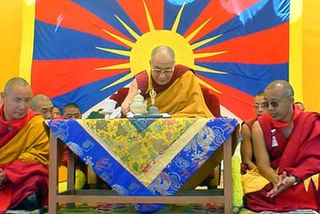
The Story of Tibet: conversations with the Dalai Lama - by Thomas Laird.
I was checking out the new book section at the local library, and I found this new popular history of Tibet entitled : The Story of Tibet: conversations with the Dalai Lama - by Thomas Laird.
I started reading it and immediately found it an easy read and engaging. I am not going to do a review here, since I am just beginning on it, but I would recommend it highly as it is well done, and you get a thorough account of Tibets history as viewed by the Dalai Lama himself.
There is a very good passage on page 367, which I will quote several paragraphs of, as it elucidates His Holiness's view of the Tibet/China situation in 2006 and on into the near future.
The interviewer is Thomas Laird the author :
What is your prediction for the future?
DL:"I believe truth has its own strength and we must retain our faith in truth", he answered, returning to the theme he referred to in our first interviews. "Of course guns have their own unique strength. But the strength or force of a gun is short or temporary. Temporarily it is decisive, but in the long run it is weak. The power of truth stands up. Truth always remains unchangeable. Then there is another manifestation of these two. The power of guns is often not compatible with truth and very much depends on untruths or lies. So with guns, there are usually lies and destruction. When governments keep so many state secrets, this is a sign of weakness despite military strength. If a government is compelled to keep secrets from its own people, this is a weakness. Also in China, the government has kept too many secrets from its own people. This is not good. Tibetans do not have guns, but we are very strong.
We have suffered a lot. We have been victimized, but still (tell) the truth. There is no lie, no effort to hide our mistakes. We are open. Anybody is welcome to look at what we are doing. We are trying to be open, and this is a manifestation of the truth and this is a real strength. That is why I feel that , for the future, there is hope and it is positive."
"Some people might not see the situation you face so positively, " I said.
DL:" If you look at the Tibet situation locally," he replied, " then it seems hopeless, desperate, and it seems our time is running out. But in reality the Tibetan problem is not hopeless at all, not like problems from a civil war. Our problem is we had a conflict with a new guest with a gun who came without a proper invitation. But things change. The Tibet issue is very much linked to the situation within China proper. China, no matter how organized, is part of the world, (and) change is part of the world. In the last fifteen to twenty years China has changed dramatically, and this change will continue. The totalitarian system has changed and has lost its ideology, and politicians seem primarily concerned with power. Sometimes I feel I am a more genuine Communist than them.
"The existence of a totalitarian government requires military force.," the Dalai Lama continued firmly. " If it does not have any proper sort of aim or ideology, just power, such a system is unhealthy and is bound to change. Because of different technologies like the Internet, it is impossible for any government to keep so many secrets or secrecy, and this makes change inevitable. Therefore, change is already taking place, and the time for totalitarianism is running out. On the Tibetan side, the spirit is strong, and support from the outside world is increasing. I feel from a wider perspective, there is very much hope".



No comments:
Post a Comment